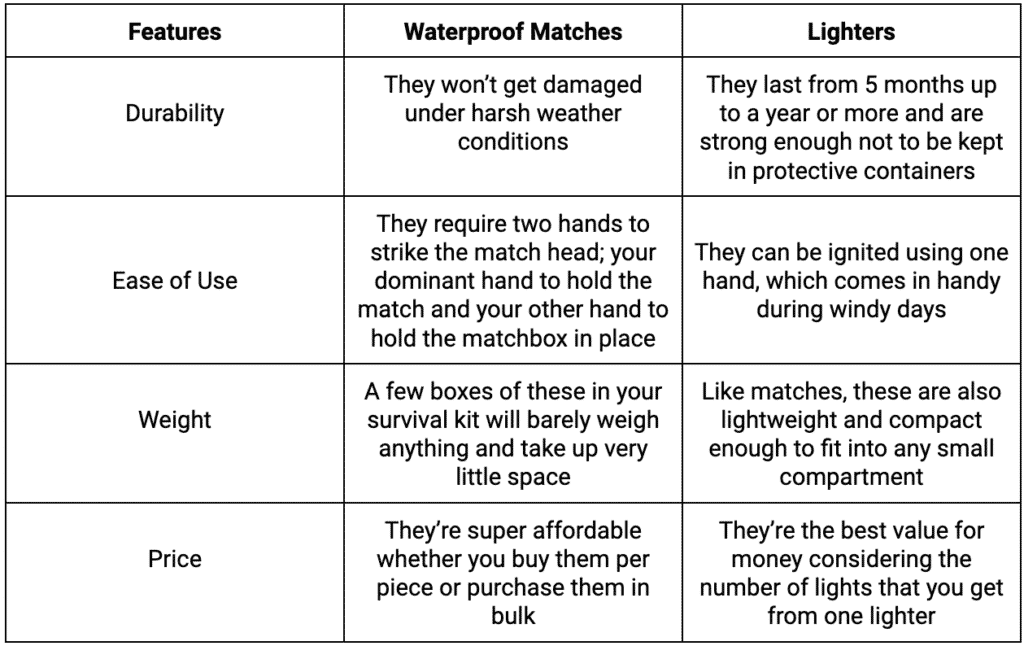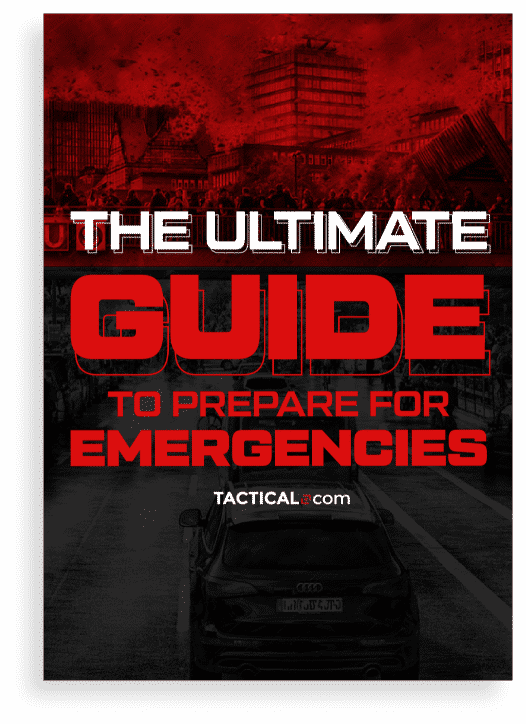Fire is crucial in every survival situation. It provides warmth, cooks food, purifies water, signals rescuers, provides light, keeps wild animals at a distance, and offers comfort.
In short, it does wonders, which makes starting a fire an essential survival technique. Two of the most conventional fire starters are matches and lighters, each boasting unique features.
To help you decide which one to include in your fire starter kit, let’s look at the benefits of each fire starter:
5 Reasons Waterproof Matches Should Be Your Choice
They’re Designed to Work in a Wet Environment
Waterproof matches aren’t called waterproof for nothing.
Unexpected showers can be a problem when you’re stuck in the wild or bugging out on foot.
If you don’t have a proper shelter, not only will you get drenched in the rain, but your SHTF gear will as well. Your precious fire starter kit won’t be spared. But if you keep a box of waterproof matches in there, you won’t have to worry about spending a cold night in the woods, freezing your butt off.
They’re Featherlight
You want to go as light as possible when packing your get home bag and bug out bag. So waterproof matches are the perfect fire starter to include in your list of survival supplies.
One or a few boxes barely weigh anything. Hell, you won’t even feel that they’re there, and we think that’s awesome.
They’re Compact
Since waterproof matches are small and neatly packed together, they’ll take up very little space in your survival kit. They’re also the kind of fire starter you can take anywhere. If you want to carry some every day, a small box will fit perfectly in your front pocket.
They’re Super Affordable
You can buy ‘em per piece or purchase in bulk, and these bad boys still won’t break the bank.
Waterproof matches are an excellent fire starter option to stock up on if your primary fire starting tool gets lost or somehow stops working.
Since seasoned preppers consider it wise to have at least one reliable alternative to essential survival tools for emergency preparedness, choose something cheap like waterproof matches.
They Won’t Leak
Matches don’t require any fuel, so obviously, you won’t have to worry about the possibility of fuel leakage. You also won’t have to constantly check your backpack or storage space to see if the fuel has contaminated your other survival supplies.
Fuel leakage is a potential safety hazard and can lead to a fire or, worse, an explosion, so you want to avoid that as much as possible.
5 Reasons Lighters Should Be Your Choice
They Last Long
Average lighters can ignite up to 3,000 times when used wisely during survival situations.
If you store a lighter appropriately and have a fuel source to refill it, it can last from 5 months to a year or even more. This means there’s no need to ration a lighter’s fuel when starting a fire.
They’re the Best Value for Money
Lighters are already a steal considering the number of lights you get from a single one. Most are reasonably priced with efficiency and effectiveness in mind, so you should automatically add them to your arsenal.
They’re Easy to Use and Handle
One of the things that makes lighters great is that you can operate them using a single hand. This feature is handy in an SHTF scenario where windy conditions could make starting a fire difficult. Since you just need one hand to ignite it, your other hand can shield the flame from wind or rain. Pretty convenient, huh?
They’re Lightweight
Another feature that makes lighters convenient? They’re almost weightless and are small enough to fit into any compartment, just like waterproof matches. You can pack one in your EDC or mini survival kit and won’t feel its weight.
They Provide Immediate Access
Lighters are durable enough not to be kept in protective containers and boxes, so they’re great for when there’s a sudden power outage and you have no other source of light on your person.
Other than illuminating dark areas, you can also benefit from this fire starter in situations where you’re in the wild and a threat is present. You can use your lighter to build a fire to keep predators away quickly.
Waterproof Matches vs. Lighters
Now, let’s look at the differences between waterproof matches and lighters based on a couple of features. Here’s a table to quickly show which fire starter works best for your needs:

9 Quick Safety Tips for Matches and Lighters
Matches and lighters come in handy for emergencies and all, but they can also be sources of danger.
House fires, burns, and property damage caused by kids playing with matches are common occurrences, so have specific safety rules in place for everyone’s well-being.
Here are some measures every household should observe when handling these fire starters:
- Store matches and lighters out of the reach and sight of children on high shelves or preferably in a locked cabinet.
- Make your kids understand that matches and lighters aren’t toys by telling them the dangers of using them incorrectly.
- Keep matches and lighters away from flammable liquids like gasoline to avoid burning someone.
- Extinguish matches properly before disposing of them.
- Inspect lighters for cracks, leaks, or other defects regularly.
- Strike a match far from your body and hold it at arm’s length.
- Refill your lighter only when you’re in an open space and away from naked flames.
- Clean spilled lighter fluid thoroughly before lighting the flame.
- Assist elderly folks or people with limited mobility when handling matches and lighters.
Final Thoughts
Matches and lighters each have advantages as fire starters, but the decision lies in your hands. At the end of the day, it’s still about personal preference and which one works best for your situation.
Now that you have an idea of what features in matches and lighters are helpful in an SHTF scenario, pick your weapon of choice and stock up on them before things get out of hand.
We think it’s wise to keep both in your stockpile, though, because backups and alternatives can save your life during a disaster.
What’s your pick—waterproof matches or BIC lighters? Sound off below!



